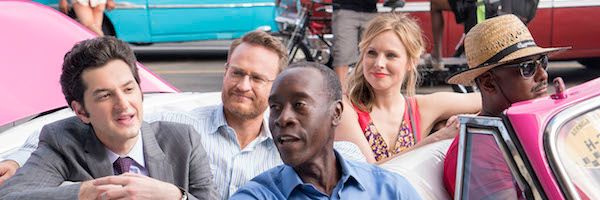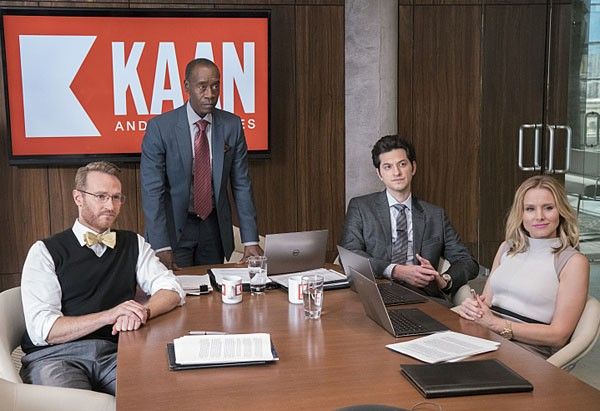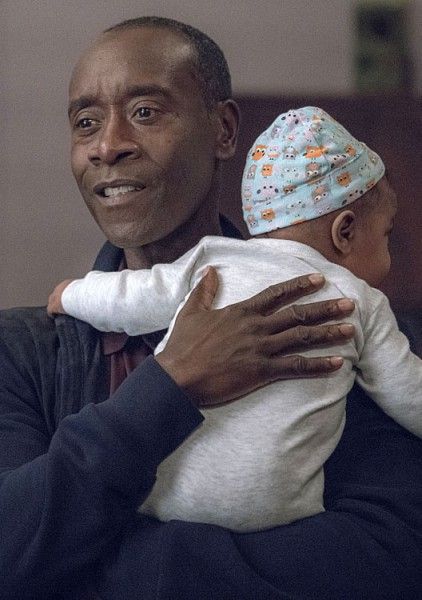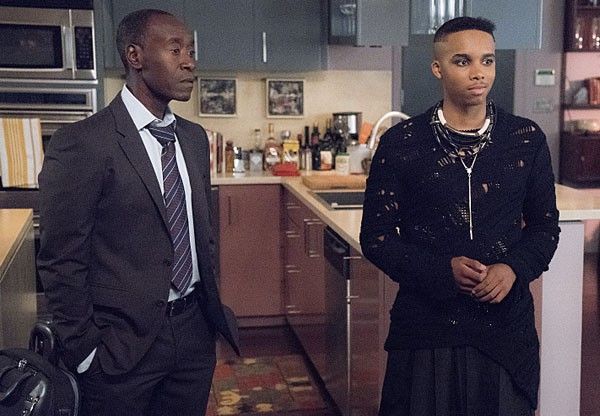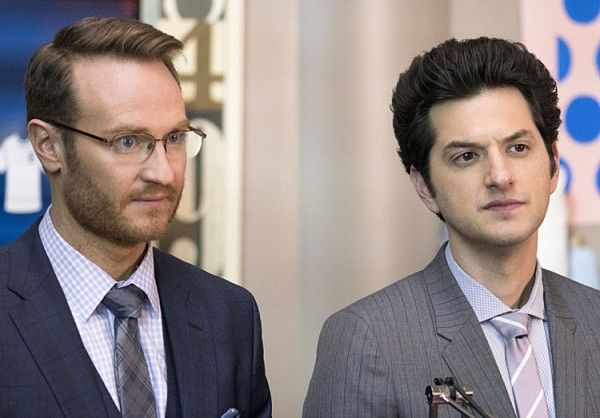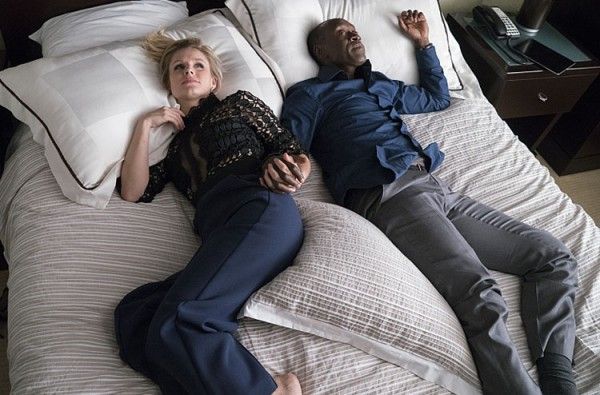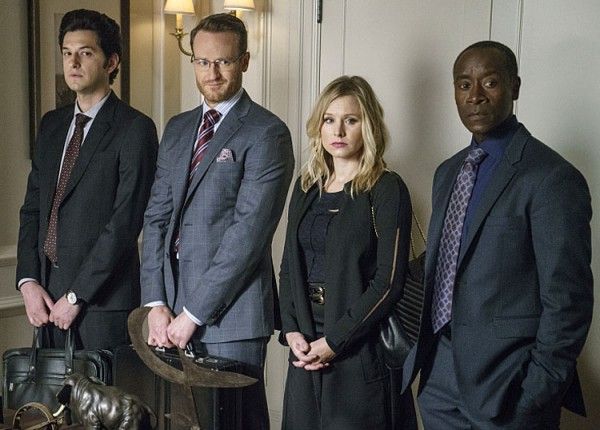The Showtime comedy series House of Lies – starring Don Cheadle, Kristen Bell, Ben Schwartz, Josh Lawson, Donis Leonard Jr. and Glynn Turman – is currently in its fifth and final season, and will wrap things up on June 12th, as the corporate sharks make their way to Havana, Cuba, marking the first time an American scripted TV show was shot there since the restoration of diplomatic relations. Created by Matthew Carnahan, the series has tackled such hot-button topics as gender identity, wealth inequality, white privilege, police brutality, interracial relationships and the pot business, always using honesty and a sense of humor.
During this exclusive phone interview with Collider, executive producer Jessika Borsiczky talked about the bittersweet end of the show, exploring the lives of characters in a soul-sucking and dark world over five seasons, making the transition to writer and director, why she felt ready to make her directorial debut with Episode 507, the experience of shooting the final episode in Cuba, having to cram so much material into 30-minute episodes, and what she’ll remember most about being a part of House of Lies for five seasons.
Collider: Congratulations for getting to five seasons with this show, which is something that few shows accomplish anymore. At the same time, is it bittersweet that it’s all ending?
JESSICA BORSICZKY: Yeah, it is. There’s a sadness because it was such a gratifying experience. We got to push all the boundaries and cross all sorts of lines. And working with [Don] Cheadle, Kristen Bell, Ben Schwartz and Josh Lawson, there could not have been a more familial, professional environment. The great part is that we got to make a boundary-breaking show for five seasons, and we walked away from a show that we felt like we got to take every chance we wanted with. It was so fulfilling. But, the heartbreaking part is to know that we’ll never work with a cast that has so much love again. I’ll miss it, every day.
When you started out with this show, could you ever have imagined that you’d be able to tell the stories that you’ve told, and that it would all end up where it does in the series finale?
BORSICZKY: To be honest, I have to say yes. We knew that we were exploring how characters could find a soul in a very soul-sucking and dark world, which is the world of finance and the 1%. How do you find meaning and a true journey for all of these characters is the whole reason it excited us to do a character story in this world, from the beginning. We didn’t know exactly what some of the details would be. And Kristen Bell getting pregnant very regularly while we were filming the show determined some storylines that we might not have gone for. But, we always sensed that it was going to be about Marty not finding himself for quite some time. We felt like the honest portrayal was for him to gain either not at all or only a very little bit, and then to fall back, along the way. And then, towards the end, you’d see him getting closer to his humanity and his personal journey in taking some steps. This season is showing some deeper and better steps forward for all of the characters, but still in a very real way that doesn’t feel like it’s just convenient for your storytelling. The best privilege of having a show go for five seasons is that you know the actors and you really know the characters, and they’ve become so real. We’ve gotten to write for them, knowing who they truly are, and I think they feel especially authentic this season.
You’ve produced other TV shows before, but this is the first series that you’ve written episodes for and you made your directorial debut. How did all of that happen, and why was this show the right show to delve into those aspects?
BORSICZKY: That’s a great question. I’ve always been somebody who, as a producer, was coming up with the ideas for the shows that I was doing, and developing them and working very closely with writers. I’m really appreciative of having the collaboration with very accomplished writers to get projects off the ground. But I’ve always secretly been writing, as my aspiration. Producing just took up the full time. Once House of Lies started going, I had some writing that, at that point, I showed Showtime and Matthew Carnahan, and there was a lot of responsiveness to me, as a writer. I had also worked so closely with Matthew to develop the characters that he was really excited for me to have the opportunity to jump in with my voice, as a writer and as a woman writer on our staff. It allowed me to take that step.
I was already in the writers’ room almost all of the time, but I got to really participate in the writers’ room with a new influence. It felt natural and supported, and I felt really lucky to get my first produced writing with the collaboration of the writers’ room. And then, to have the first writing that I ever produced be spoken by Don Cheadle and Kristen Bell, I felt to grateful. As that started to happen and House of Lies settled into a show that had its own life, and I could explore the writing part of my life, I began selling writing elsewhere and really thinking of my work, more and more, as a writer/creator, in addition to collaborating with great showrunners, as well.
And then, the directing is also something I’ve aspired to do. I’ve been really lucky because I started in the business when I was 20, and from my very first job, which was at HBO, I always had great exposure to production and I was always somebody who really flourished on set. I had a great understanding of being on set and in production, and I think that background is something that’s been very helpful, over the years, in doing television. Also, having done movies and having spent a lot of time in editing, there was a point, about six or seven years ago, that I challenged myself to start shadowing directors that I was working with. I started to really look at the material as a learning tool for directing, and I started to be able to edit in my head. That helped me become a more useful producer on set with directors because I really can imagine the finished meal, as opposed to just the ingredients, and it really gave me a great sense of confidence about how I was approaching my first directing.
So, I felt very, very ready, having worked as a producer and writer with the actors, over the seasons, having spent so much time in editing, and having worked so closely with directors, both on House of Lies and on movies and television. I felt really comfortable and really ready, and so excited to take it on. I know it’s all about learning more and trying more, but every day that I was directing this episode of House of Lies, which was my first ever chance to direct, I would wake up about three or four hours early because it was like Christmas morning. I couldn’t wait to get to set. I couldn’t wait to put the actors in the setting that I had envisioned for them, and work with them. It was really the most positive experience I’ve had, so far, in my career. I loved it. There wasn’t a minute of it that I regretted, and I can’t wait to do it again.
Did you write Episode 507 (“One-Eighty”) knowing that you would be directing it? Were you aware that those two things were going to happen, for this particular episode?
BORSICZKY: When the idea of directing came up, I was interested in directing someone else’s work. I always like when someone else directs my writing because ideally they bring something you didn’t think of to it. It just becomes enhanced because two minds are better than one, and I felt the same way about my directing. I thought that if I got to start with someone’s great script, then maybe I could enhance it. But everyone surrounding me, from the writers to Matthew Carnahan to the network, were all really encouraging me to write and direct the same episode, and to really just leap off the cliff into bringing my voice and my vision to the screen. In retrospect, I’m so grateful to have done that because it challenged my writing in a different way. The combination of using my writing voice with exploring how I was going to execute it eventually really challenged the vision that I was finding for it. It’s actually my favorite script that I’ve written, so far, and I think that’s really as a result of having taken both things on. So, I did know going in that I was going to be directing that episode, but as with all the episodes of the show, we broke it in the writers’ room. It’s a crap shoot, who gets which story. I just happened to get this particular episode where there was the incredible pay-off of Doug’s TED talk and exploring the really topical reality of the pot business in America. Those two things were broken in the writers’ room, and then I had to take them and run, knowing that I was going to direct.
The pot business is a topic that a lot of people are talking about right now, but having actors pretend to be drunk or high can be a tricky thing because the performances can easily become too big or too small. How did you gauge that aspect of the episode?
BORSICZKY: You’re so conscience of not wanting to make it feel like fake TV when you have characters that are drunk or high. Also, there was the additional challenge of an earlier episode this season that had our characters doing Ayahuasca, which is a very different and specific trip. For our audience, that’s a lot of nuance, so we had to make it feel like a different ride. I’m not going to lie, I drew upon a lot of personal experiences, especially for Jeannie’s annoying and ridiculous high observations. That obsession with the tiny things that are surrounding her came from what felt real to me, and from things I’ve seen or maybe possibly things I’ve done. And then, Marty, as the classic baller that he is, is getting super high throughout the episode, but you can barely tell. So then, in the final scene when he closes that deal, he’s more fucked up than anyone should be able to be and still be breathing. The challenge was how to make it feel believable with his speech while he’s that high.
We really walked the line, and I like to think that Don turned up his game just for me, knowing how much the episode meant to me. He just blew the scene away. I feel like it was some of the most exciting work he’s done on the show ‘cause it really showed how the character can reach for the edge and still be brilliant. When I wrote this script, I knew that when Marty eats all the high-powered edibles, I wanted to really make clear, without a lot of unbelievable antics, that he was really gone and in his own world, so that when he had to go to this meeting, he’d be completely incapacitated. The way that I wrote it in the script ended up being exactly what was on screen, which was that this song got into his head. I wrote into the script a song that was absolutely different from what was going on in their world, which was this song “How You Like My Cut,” by an artist named Peaches. It’s maybe the dirtiest song I’ve ever heard, and it’s this rhythmic, sexy, dirty exploration. I thought, if we could put that headspace on the screen for him, we’ll know that he’s absolutely disconnected from what’s going on around him. I was really thrilled with how the song worked out in the final cut because it carried us over from him being high and into the meeting, and I think it really sold that idea. And Don Cheadle, as Marty, would listen to the song in between takes and really lose himself in that world. He just delivered it. We understood, from that close-up on his face, that he was listening to the beat of his own drum, literally.
If you have to end a series, taking the show to Cuba is really going out with a bang. What was that experience like? Were you ever worried that you wouldn’t be able to pull it off?
BORSICZKY: When we first conceived of going to Cuba, and we knew nobody had ever done anything like this before and we would be the first, we just did it as if we were Christopher Columbus exploring. We were excited about what we were conceiving for it and what Matthew Carnahan was writing for it. Our producers on the show, Lou Fusaro and John Radulovic, who were taking on this extremely steep uphill task of getting permission from the Cuban government and the American government to go there, kept assuring us that they would get it done. We knew that it was huge, but they kept assuring us to keep going. I remember a few times going to Matthew Carnahan and saying, “Should we come up with a back-up story?” We just kept believing and we got there. And once we got there, we just knew it was going to be special, no matter how it unfolded. We got to tell the exact story that we wanted to tell. And the actors in Cuba that we cast just blew our minds. The quality of work there was beyond expectations. And then, it’s Cuba and it looked and felt like something you just can’t imitate. You can’t replicate it anywhere. How do you top that? It was clear, at that point, that that was going to be the high point to go out on.
Is cramming so much content into a 30-minute episode more of an advantage or a challenge?
BORSICZKY: That’s a really good question, and it’s something that I have really competing feelings about. On the one hand, we’ve been doing the show as 30 minutes since the beginning. At the very start, it was very challenging for us to write as much story as we wanted into the 30 minutes. As the seasons went on, we felt out the rhythm and the length much more clearly. But all along the way, the response has always been that people wish the show was an hour long. I’ve often wondered if the show would be better and sustain better as an hour, but then I end up thinking, isn’t it better to do it as a completely fulfilling half-hour and leave people wanting more, as opposed to the other way around. Could this show have lived differently as an hour? Probably. At the end of the day, doing a half-hour that feels fast, crammed, fun and non-stop, I love that energy and I think it’s the way to go.
Having had the experience of working with this cast, the crew, the writers, the directors and your fellow producers for five seasons, what will you most remember and take with you from making this show?
BORSICZKY: I’m going to start crying! There was an environment of laughter and of comedy, as an art, that was always alive. The actors on the show never went back to their trailers. We were all on set together, throughout the day. The jokes and the laughing at what we were doing infused everything. Through that, we all just smiled, all day, at work. But also, I learned so much about comedy from these guys. I’ll miss that. I don’t think I’ll ever laugh so hard at a job, every again, and I’ll miss that, forever. There was a formula to these people together that created a very happy environment.
House of Lies airs on Sunday nights on Showtime.

